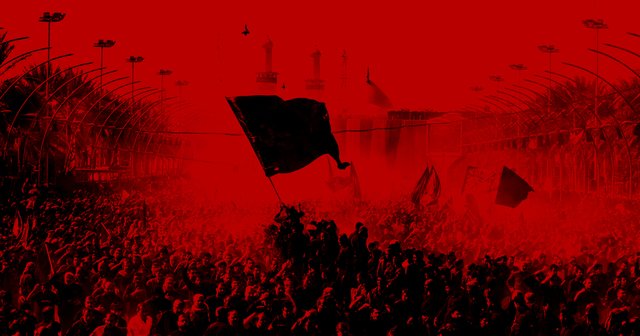
No more than 50 years had passed since the death of Muhammad (the last Prophet of Islam) and the Muslim Empire was sliding into corruption under a tyrant from the Ummayad dynasty, Yazid.
Hussain ibn Ali, the grandson of Prophet Muhammad took a stand against Yazid’s illegitimate rule. Whilst Yazid was in equal parts feared and despised for his ruthlessness, Hussain was admired and respected by society at large. Mindful of this, Yazid decided that he would demand Hussain’s allegiance, hoping to gain some form of legitimacy for his inherited rule.
Hussain’s stand against tyranny.
Hussain had a choice to make. To endorse Yazid would no doubt mean a handsome reward and a life of luxury. To refuse would invariably lead to his own demise. What should he do? What would you or I do? For Hussain the choice between the easy thing and the right thing was no choice at all. Hussain refused. He said: “I will never give Yazid my hand like a man who has been humiliated, nor will I flee like a slave… I have not risen to spread evil or to show off… I only desire to enjoin good values and prevent evil.”
Hussain ibn Ali : “I only desire to spread good values and prevent evil.”
بیش از 50 سال از زمان مرگ محمد (آخرین پیامبر اسلام) گذشته بود و امپراتوری اسلامی به دلیل فجیع تحت سلطه امپراتوری امیدیه، یزید، فاسد شده بود.
حسین بن علی، نوه حضرت محمد، علیه حکومت غیرقانونی یزید ایستاد. در حالی که یزید در بخش های مساوی از هراس و بی احترامی ناشی شد، حسین به وسیله جامعه مورد تحسین و احترام قرار گرفت. با توجه به این امر، یزید تصمیم گرفت که از وفاداری هوسیان بخواهد، امیدوار است به نوعی مشروعیت برای حکومت ارثی اش دست یابد.
حسین علیه استبداد است.
حسین انتخابی داشت. برای تأیید یزید بدون شک به معنای پاداش خوش تیپ و زندگی لوکس است. برای رد کردن به طور پیوسته منجر به مرگ او می شود. او باید چه کار کند؟ من و تو چه کار میکنیم؟ برای هاسین انتخاب بین چیز آسان و چیز درست هیچ انتخابی نبود. حسین رد کرد او گفت: «من هرگز یزید دست خود را مانند یک مرد که تحقیر شده است، نخواهم برد و از برده فرار نخواهم کرد ... من نمی توانم به گسترش شیطانی و یا نشان دادن بپردازم ... من فقط مایل هستم ارزش های خوب و شرارت را از بین ببرم. "
حسین بن علی: "من فقط تمایل دارم که ارزشهای خوب و پیشگیری از شرارت را گسترش دهم."
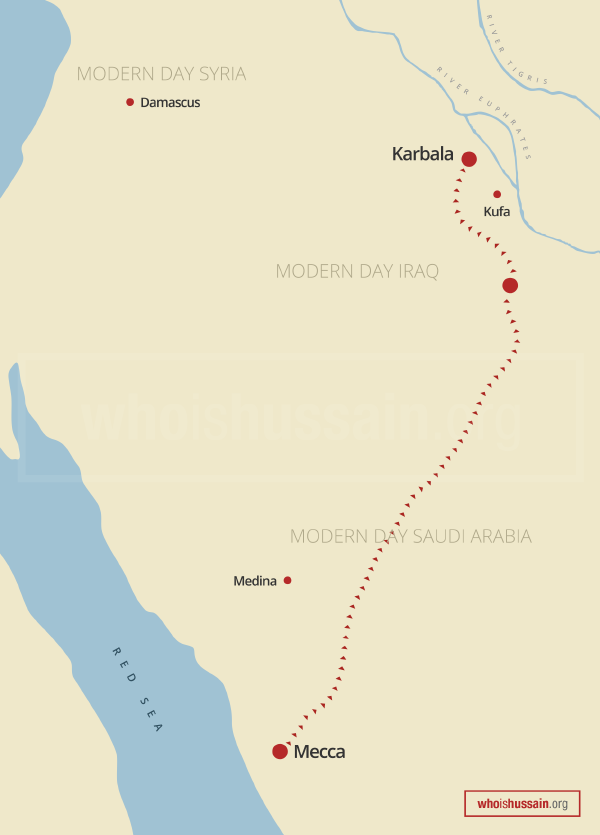
( Map of Hussain ibn Ali’s journey from Mecca (modern day Saudi Arabia) to Karbala (in Iraq). )
The journey from Mecca to Kufa.
His life now under threat, Hussain decided to move himself and his family to Mecca in the hope that Yazid’s agents would respect the holy city. As he waited, pondering his next move, messages of support began to arrive from across the empire. He left for Kufa, a city in Iraq, but en route, he was intercepted by a battalion of Yazid’s soldiers, who blocked Hussain and his supporters from going towards Kufa and instead forcibly diverted towards the desert town of Karbala. Once they reached Karbala, forces surrounded their small band and blocked their access to the water supply. With both camps stationed at Karbala, a stalemate ensued. Hussain had made it clear that he could not, and would not, bow to Yazid. The opposing forces of 30,000 soldiers, which vastly outnumbered Hussain’s small band of seventy-two men and their families, were under strict orders not to let Hussain leave. After a week, word reached Hussain that Yazid had sent orders that he was not to be allowed to leave Karbala until he had taken an oath of allegiance. The end was drawing close.
(نقشه سفر حسین بن علی از مکه (روز عربستان سعودی) به کربلا (در عراق).)
سفر مکه به کوفه.
حسین در حال حاضر در معرض تهدید قرار گرفته است و تصمیم دارد خود و خانواده اش را به مکه منتقل کند، امیدوار است که نمایندگان یزد به شهر مقدس احترام بگذارند. در حالی که منتظر حرکت بعدی خود بود، پیام های حمایتی از سراسر امپراطوری شروع به کار کرد. او برای کوفه، یک شهر در عراق ترک کرد، اما در مسیر، او توسط یک گردان سربازان یزید دستگیر شد، که هوسیان و طرفداران او را به سوی کوفه سوق داد و به جای آن مجبور شد به سمت شهر کویری کربلا حرکت کند. هنگامی که آنها به کربلا رسیدند نیروها گروه کوچکی خود را محاصره کردند و دسترسی آنها به آب را مسدود کردند. با هر دو اردوگاه مستقر در کربلا، یک اشتباه آغاز شد. حسین روشن کرده بود که نمی تواند و نمی خواهد به یزید تعظیم کند. نیروهای مخالف 30،000 سرباز که به طور عمده تعداد کمی از گروه حسین از هفتاد و دو مرد و خانواده هایشان بودند، تحت نظارت شدید قرار نگرفتند تا اجازه ورود حسین را ندهند. پس از یک هفته، کلمه به حسین رسید که یزید دستور داده بود که او مجاز به ترک کربلا نخواهد بود تا اینکه او را به وفاداری بردارد. پایان نزدیک شدن بود
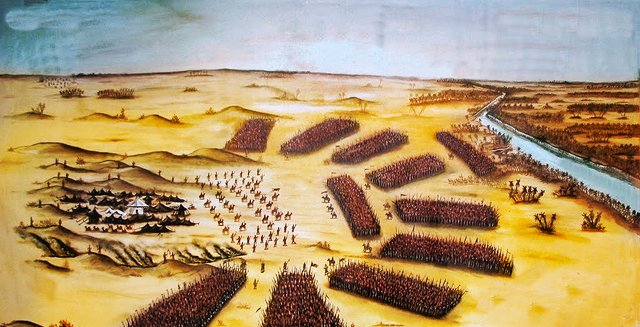
( Illustration of the battle map where Hussain and his camp had been encircled by an army of 30,000. )
The final stand of Hussain ibn Ali.
That night Hussain assembled his group, stressing to them that it was his life that Yazid wanted and that they might be able to escape. Again, Hussain’s selflessness shone through. There he stood, amongst his family and companions, all having been deprived of water in the scorching desert for three days, pleading with them to leave him and save themselves! After a few days of this stalemate, the government forces were commanded to attack and kill Hussain and his companions. Hussain’s men were vastly outnumbered. The hour for battle commenced, Hussain’s companions departed from their camp in small bands and one after the other – all fighting valiantly before being killed. Throughout the day the forces of Yazid asked Hussain for his allegiance, yet Hussain resisted. Eventually Hussain was alone with no one left to support him. Fatigued, thirsty, and heavily wounded, Hussain fell to the ground as the women and children looked on. He too was killed mercilessly, yet he died holding on firmly to his principles.
(تصویر نقشه نبرد که حسین و اردوگاه او توسط یک ارتش 30،000 محاصره شده اند.)
موضع نهایی حسین بن علی.
حسین در آن شب گروه خود را جمع کرد و به آنها تأکید کرد که این زندگی او بود که یزید می خواست و ممکن است بتواند فرار کند. باز هم حسن نیت حسین از طریق در آنجا او ایستاده بود، در میان خانواده و همراهانش، که همه مدت سه روز از آب در بیابان سوزان محروم بودند و با آنها می خواستند او را ترک کنند و خود را نجات دهند! پس از چند روز از این بن بست، نیروهای دولتی فرمانده حمله به هوسیان و همراهانش شدند. مردان حسین بسیار کمتر بودند. ساعت برای نبرد آغاز شد، هواداران حسین از اردوگاه خود در گروه های کوچک جدا شدند و یکی پس از دیگری - همه با شجاعت قبل از کشتن. در طول روز نیروهای یزید از هوسیان خواسته اند تا هوشیاری خود را حفظ کنند، اما حسین با آن مخالفت کرد. در نهایت حسین به تنهایی با هیچ کس به حمایت از او نرفت. خستگی، تشنگی و شدید زخمی شدن، حسین سقوط کرد و زنان و اطفال به آن نگاه کردند. او نیز بی رحمانه کشته شد، اما او درگذشت و به اصول خود پایبند بود.
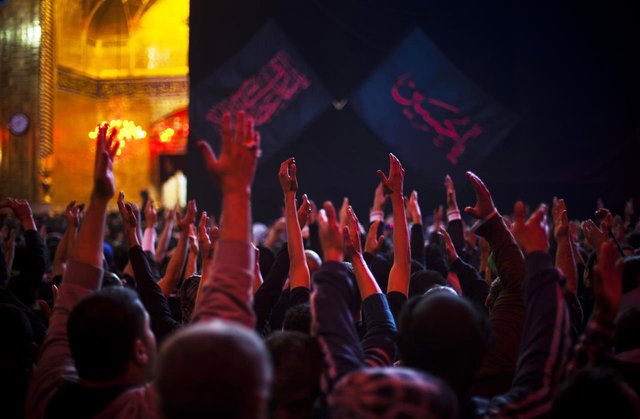
( Hussain ibn Ali’s death anniversary is mourned annually on what’s referred to as The Day of Ashura. )
(روز جهانی عاشورا سالانه سالگرد حسین علی بن الحسین).
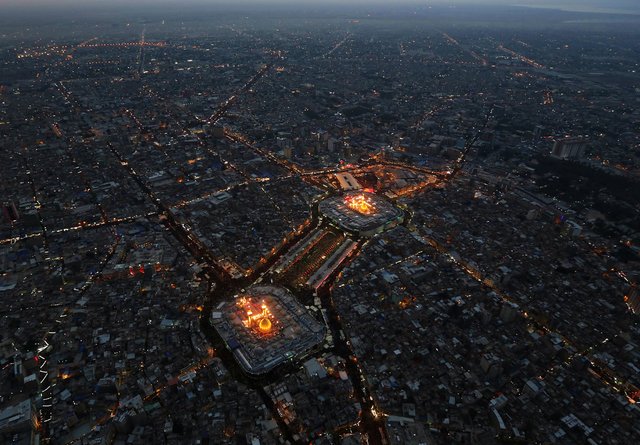
( Millions of people from all walks of life visit the resting place of Hussain and his companions in Karbala, Iraq. )
(میلیون ها نفر از تمام حوزه های زندگی از محل استقرار حسین و همراهانش در کربلا، عراق دیدن می کنند.)
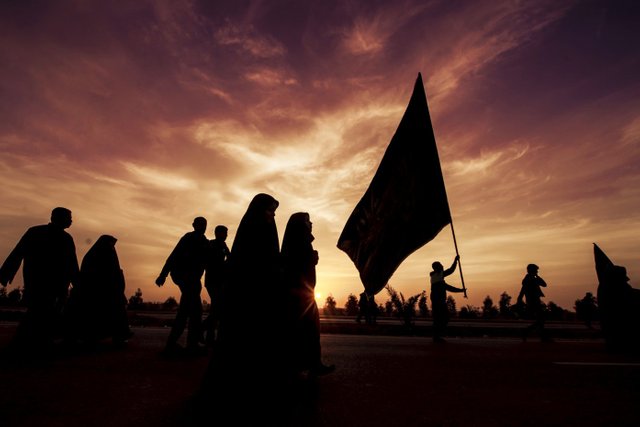
( Around 20-25 million visit Hussain’s shrine on ‘Arbaeen’ day. It’s the largest peaceful gathering in the world. )
Hussain’s victory and inspiring legacy.
After his death, the women and children from Hussain’s party were taken captive. His sister, Zainab, took up the mantle of leadership of the small band, and gave speech after speech condemning the actions of Yazid and his government, culminating in a confrontation in the ruler’s own court. Zainab was perhaps the first person to be inspired by Hussain’s stand, using it as a catalyst for change. She refused to be subdued and put her fear to one side so she could hold to account those responsible for the moral decay of society. Despite the pervasive sexism of society at the time, Zainab managed to lead and inspire both men and women. Hussain’s example, that one man can stand alone against an army of thousands, inspired her to the point where she castigated and berated a murderous dictator in his own palace, laying the foundations for the eventual overthrow of the Umayyad dynasty. Today millions of people pay homage to Hussain ibn Ali for his stand and annually mourn the tragic Battle of Karbala in which Hussain, his family and loyal companions were brutally killed one by one. Pilgrims from all walks of life visit the Imam Hussain shrine to pay their respects in the city of Karbala, Iraq.
(حدود 20 تا 25 میلیون نفر از حصین حسین در روز «آرابین» بازدید کرده اند. این بزرگترین جمع آوری صلح آمیز در جهان است.)
پیروزی حسین و میراث الهام بخش.
پس از مرگ او، زنان و فرزندان حزب حسین اسیر شدند. خواهر او، زینب، مدال رهبری گروه کوچکی را به دست گرفت و بعد از بیان سخنان محکوم کردن اقدامات یزید و حکومتش، به نتیجه رسید و درگیری در دادگاه حاکم حاکم بود. شاید زینب اولین فردی بود که از موضع حسین الهام گرفته بود و از آن به عنوان یک کاتالیزور برای تغییر استفاده کرد. او حاضر به تسلیم نشدن نیست و ترس خود را به طرفین قرار می دهد تا بتواند مسئولان فاسد اخلاقی جامعه را به حساب آورد. زینب با وجود سوسیالیسم فراگیر جامعه در آن زمان موفق به رهبری و الهام بخش هر دو مردان و زنان شد. مثال حسین که یک نفر می تواند به تنهایی در برابر ارتش هزاران تن مقاومت کند، الهام بخش او به جایی است که او را در کاخ خود به قتل رساند و دیکتاتور قاتل را محکوم کرد و پایه های سرنگونی سلسله امویان را تسخیر کرد. امروز میلیون ها نفر از احزاب حسن بن علی برای احضار خود و سالخوردگی نبرد کربلا که در آن حسین، خانواده اش و همراهان وفادار آنها یک به یک به صورت وحشیانه کشته شدند، قدردانی می کنند. زائران از تمام حوزه های زندگی از حرم امام حسین (ع) دیدن می کنند تا در شهر کربلا، عراق، به آنها احترام بگذارند.
Stay with us 👌
Hi! I am a robot. I just upvoted you! I found similar content that readers might be interested in:
https://www.quora.com/Do-you-know-Hussain-ibn-Ali-What-do-people-think-about-him
Downvoting a post can decrease pending rewards and make it less visible. Common reasons:
Submit
thank you sir
Downvoting a post can decrease pending rewards and make it less visible. Common reasons:
Submit